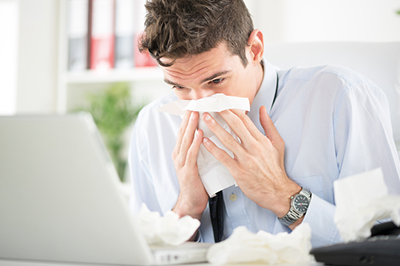How to Help Get Rid of a Cold or the Flu

Unfortunately, we all have to deal with colds and the flu at one time or another. While they can both be unpleasant, finding out how to treat a cold or flu, and knowing which remedies actually work, will help you to feel better faster.
Learn more about some easy, at-home cold and flu treatment tips to help ease your symptoms below.
Help Get Rid of Cold or Flu Symptoms – 10 Tips to Try
1. Rest and stay warm
It’s best to stay home from work or school when you’re suffering from a cold of fever – not only to quicken your own recovery, but also to avoid infecting others. If you’re suffering from a cold, a hot water bottle or electric blanket in your bed will help to keep you nice and warm while your body heals. Using a vaporizer or humidifier will also moisten the air in your home and may ease symptoms such as congestion or a cough.
However, if you have a fever (common with the flu) be careful not to overheat yourself, as this could worsen your symptoms. Try a paracetamol-based OTC medication such as Night Nurse, which will help to relieve a high fever.
2. Drink plenty of liquids
Ask an expert how to get rid of a cold or the flu and one of the first things they’ll recommend is that you drink plenty of liquids. When you’re unwell, your body needs more liquid than usual – particularly when you’re experiencing a fever, which will cause you to sweat more. So be sure to sip on lots of water, juice, broth or soup to help aid your recovery and avoid dehydration.
Feed a cold – starve the flu? Learn about the best things to eat and drink when you’re ill with our helpful guide.
3. Ease your sore throat
A sore throat is more than just a pain in the neck. It can also make it more difficult to drink and eat, which may exacerbate your symptoms. Night Nurse Liquid contains dextromethorphan to help reduce coughing, along with paracetamol to relieve pain, so that you can keep sipping on those fluids and get better. And because it’s in liquid form, it’s also easy to swallow.
Discover the different types of cough and how to take care of a cough at night.
4. Clear your nose
A stuffy or runny nose isn’t the result of too much mucus – it's actually because your nasal passages are swollen. When you have a cold or the flu, the tiny blood vessels in your nose are irritated and become inflamed. Dry air exacerbates a blocked nose, so putting a humidifier in your room or inhaling steam from a bowl of hot water can help to moisten the sinuses. Make sure the water isn’t too hot, and lay a towel over your head as you breath the steam in to stop it from escaping.
You can also try Night Nurse to help ease your runny nose. Among its other ingredients, it also contains promethazine, which works effectively to dry up a runny nose.
5. Try over-the-counter pain relief
A common symptom of both colds and the flu is a headache, and with the flu you may also suffer from muscle aches. Taking over-the-counter pain relief medications can help alleviate these symptoms. Night Nurse Capsules, which contain paracetamol, can be taken before bed for fast and effective relief of the most common painful cold and flu symptoms. Paracetamol also works to bring a fever down, which is very common with the flu.
6. Get lots of sleep
Getting proper rest is essential for a quick and complete recovery, so don’t try to soldier on if you’re suffering from cold or flu. Make sure you have everything you need on your bedside table – medications, water and tissues – so that you don’t need to get out of bed too often. Ensure your room is dark and quiet, and switch off your phone to create the best environment for sleep.
To help curb your cold and flu symptoms at night and help maximise rest, try Night Nurse.
7. Treat your cough
A dry cough can be extremely annoying. It can wake you up in the night and prevent you from getting back to sleep. If you are suffering with a dry, tickly or non-productive cough (where you don’t cough up any phlegm), you can use cold and flu tablets, such as Night Nurse Capsules for unbeatable strength* relief from cold and flu symptoms. Night-time capsules relieve your dry cough to help you sleep better.
8. Reduce stress
Stress is a natural part of life, but it can take a toll on your body. And in the case of illnesses like a cold or flu, it can worsen your symptoms and slow down your recovery. Stress reduces your body’s production of white blood cells – which is uses to fight off infection – and puts a strain on your immune system. This increases your risk of developing a cold or flu, and also makes it harder for you to get better.
Although most people will get over a cold or flu without extra help, children, older people, and those who have compromised immune systems are at risk of developing more serious conditions – such as bronchitis or pneumonia. If you’re suffering from either a cold or flu, ideally you’ll have someone around to help look after you, so that you can focus on resting and improving.
If you feel you’re not feeling better within one to two weeks, or your symptoms get worse, call NHS Direct on 111 for advice.